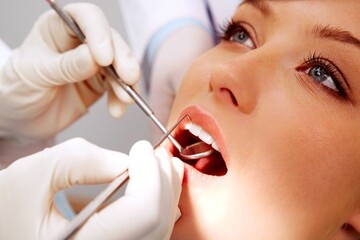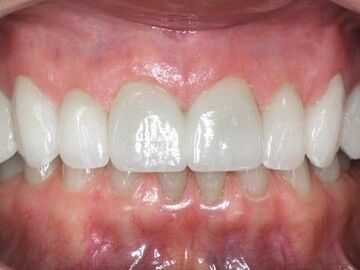Gum Disease
Periodontal diseases are infections of the gums which gradually lead to the destruction of the bone support around your natural teeth. These diseases effect more that 80% of Americans by the age of 45.
Dental plaque is the primary cause of gum disease. Bacteria found in plaque produce enzymes and toxins which injure the gums. Injured gums turn red, swell and bleed easily.
If this injury is prolonged, the gums separate from the teeth, causing pockets (spaces) to form.
Plaque can also harden into a rough, porous substance known as calculus (tartar).
This can occur both above and below the gum line. As periodontal diseases progress, the supporting gum tissue and bone that holds teeth in place deteriorate.
If left untreated, this leads to tooth loss. Pain is usually not present until damage from this disease is very advanced.
Research has shown that gum disease can influence heart disease and other health conditions in negative ways. They suggest that gum disease could even be a more serious factor in heart disease than smoking, cholesterol, hypertension and age. One reason for this is the fact that the bacteria found in diseased gums can come loose and move throughout the body. When this bacteria reaches arteries it can cause arterial plaque to build up and harden which in return adversely affect blood flow.
One of the earliest stages of gum disease is gingivitis. Gingivitis causes the gums to become swollen and bleed due to the toxins, enzymes and plaque byproducts that are created. In order for your gums to return to a healthy state, treatment from Dr. Jory is required in addition to proper oral hygiene.
Moderate gum disease is when the tooth's bone tissue starts to deteriorate. Periodontitis occurs when plaque byproducts destroy the tissues that anchor your teeth in the bone. The gums deteriorate and begin detaching themselves from the teeth forming gum pockets, which allows more plaque to collect below the gum line. This causes the roots of the teeth to become susceptible to decay. Generally, patients notice an increase in sensitivity to hot and cold and to touch.
Suppress the urge to avoid cleaning teeth that are sensitive to cold! Teeth that have suffered damage from gum disease will always be more sensitive to cold. Avoiding them only makes it worse.
After any dental treatment, teeth may become sensitive. This is their way of letting you know that they've been injured. Any injury (cavity, tooth clenching/grinding, gum infection) can injure the nerves in a tooth. This should not last long if the teeth are kept clean. If the teeth are not kept clean, the sensitivity will remain or get worse.
If your teeth are especially sensitive consult with your dentist. This could be a sign of the need for root canal treatment or a gum tissue graft. Or a desensitizing toothpaste (with potassium nitrate) or concentrated fluoride gel (0.4% stannous- or 1.1% sodium-fluoride) may do the trick.



 Request an Appointment
Request an Appointment
